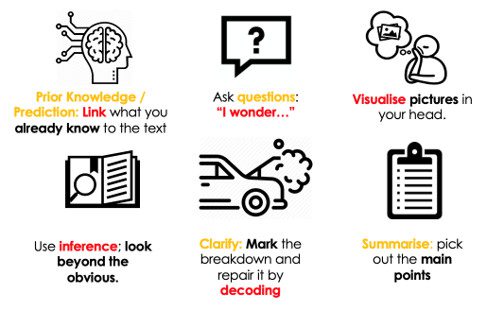We recognise that reading is a complex process but is fundamental to every subject and beyond the classroom. We believe that reading promotes well-being as well as life choices and we are committed to supporting our students’ reading journeys. We encourage our students to develop strategies to support their comprehension and decoding of questions, articles, texts, scripts, journals and books.
Our teaching of vocabulary as well as skimming, scanning and phonics, when appropriate, supports our students’ abilities to decode a text.
We explicitly teach a range of active reading strategies to help students to comprehend a variety of texts. We use these 6 active reading strategies and reinforce them through Reciprocal Reading (considered group reading).

Students complete the National Group Reading Test to help them, and us, understand how we can support their sentence and paragraph comprehension.
We encourage students to read around their subjects, to read for pleasure and for well-being. We have an excellent library and promote a range of reading challenges, ‘big events’ and author visits.
Supporting reading at home:
Encourage your child to read for 20 minutes each day. Work up to this time if it seems a lot. Talk about what they’ve read. They could read their school library book, a book recommended on one of our reading lists, a community library book, an e-reader or a longer article. Maybe read at the same time and then talk about what you’ve both read.
Ask questions about reading to promote comprehension as well as decoding. Use the 6 active reading strategies to guide you:
- “What do you think this might be about? Why?” / “What do you think you have to do?” / ”How is this like something you’ve read before?”
- “I wonder why she might have done that?” / “Have you ever felt like that?”
- ”What did you visualise when you read that description?”
- “What might he feel? How do you know?” / “What is the question asking you to do?”
- “What might that word mean?” / “How could you say that in a different way?”
- “What happened in that paragraph?” / ”What was that section about?”
Encourage your child to read to you or to a sibling. Read to your child. Take it in turns to read a page or a chapter. Talk about reading to develop comprehension, don’t just assume that they understand because they can decode.
Listen to audio books, use an e-reader or visit the library. Read a range of genres – encourage your child to complete our library bingo and book challenges.
If your child is practising to decode, encourage them to sound out words, break up words into syllables, blend the sounds. Practise reading sounds aloud.

